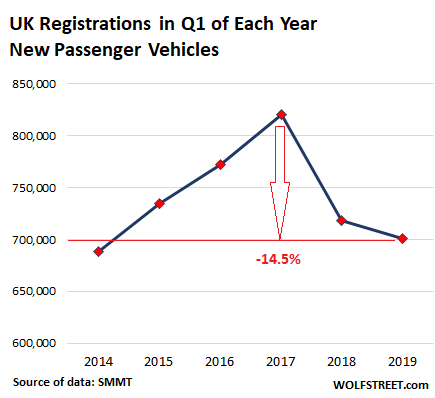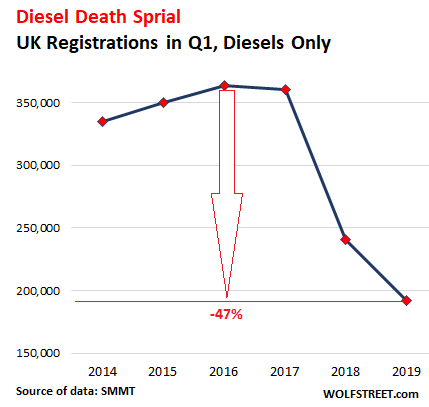But sales of “superminis” are growing.
By Don Quijones, Spain, UK, & Mexico, editor at WOLF STREET.
Sales of new passenger vehicles, as measured by registrations, fell 3.4% in March from a year earlier in the UK, the second largest auto market in Europe, as consumers shunned showrooms during what’s usually a bumper month for sales due to a number plate changeover, according to the the Society of Motor Manufacturers and Traders (SMMT). Total sales in March of 458,054 vehicles was the worst performance in March since 2013.
Sales in the first quarter of 2019 dropped 2.4% from Q1 2018. But Q1 2018 had been a terrible quarter, when sales had plunged 12.4% from Q1 2017. So in Q1 this year, sales were down 14.5% from Q1 2017 and were close to where they had last been in Q1 2014:

“March is a key barometer for the new-car market, so this fall is of clear concern,” said SMMT’s Chief Executive Officer Mike Hawes in a statement on Thursday. “We urgently need an end to the political and economic uncertainty by removing permanently the threat of a ‘no-deal’ Brexit.”
With the UK government and parliament having descended into a state of virtually unprecedented chaos and raw sewage reportedly leaking through the roof of the chamber of the House of Commons, the chances of that happening in the next two or three days are tiny. But Hawes can nonetheless rest assured that the political establishment on both sides of the English Channel will work tirelessly to ensure that the threat of a “no-deal” Brexit is neutralized by next Friday, when the latest Brexit deadline expires.
The UK is the second largest auto market in the EU, behind Germany. It is also the largest single export market for German automakers, which sold 800,000 new cars there in 2016, or 20% of their overall global exports. Fewer cars are exported to its two biggest overseas markets, China and the US, since German automakers have factories there.
In the full year of 2018 sales dropped 6.8%, which in turn followed on the heels of a 5.7% slump in sales in 2017. And in Q1 2019, the slump continued.
The real problem is the collapse in sales of diesel vehicles in the UK, mirroring a trend that is wreaking havoc across Europe’s auto markets. In the first three months of 2019 year-on-year sales plunged 20.3%. During the three years since Q1 2016, diesel sales have collapsed by 47%, to just 191,785 units in Q1 2019:

Diesels’ share of total registrations has plunged from a 49% share in 2014 to a 27% share in Q1 2019.
Gasoline vehicles continue to pick up some, though not all, of the slack, with sales rising by 5.9% in Q1 2019. There was also a 14.7% rise in sales of alternatively fueled vehicles, which include battery-electric vehicles and plug-in hybrid electric vehicles. But while their numbers are rising, their combined market share is still only around 5% of total registrations.
By customer type: in Q1, sales to consumers and fleets were down by 0.8% and 0.9%, respectively. It was in the business sales category where the real pain was felt, with registrations plunging a staggering 41.4% on the first quarter of 2018.
In March there were declines across almost all vehicle segments, including popular Dual Purpose (-1.8%) and small cars (-4.0%). The only exception was the supermini (small robust cars) – Britain’s favorite vehicle type – which saw a 4.3% increase in demand, and accounted for 33.7% of total registrations.
Below are the best sellers in the UK for both March and the first quarter of 2019 (table via SMMT). Note that in March, nine of the ten best sellers were either small cars or superminis, the exception being the Nissan Qashqai.

The March sales figures are the latest bad news for the U.K. car industry. UK car production is also falling precipitously. While there may be a temptation to pin much, if not all, of the blame on Brexit-related uncertainty, it’s worth bearing in mind that car sales have been sliding across the EU over the last six months. In Spain alone sales slumped by over 8% in February and 4% in March.
But with the UK market so important for Europe’s struggling car manufacturers, both in terms of sales and production, it’s perhaps no surprise that Brussels is pulling out all the stops to prevent Europe’s second largest economy from crashing out of the EU next week. But that may not be enough to stop an accidental Brexit from occurring. And even if it is, there are still big question marks over whether a long Brexit extension will stem the sliding car sales or instead merely prolong the economic pain and uncertainty. Time will probably soon tell. By Don Quijones.